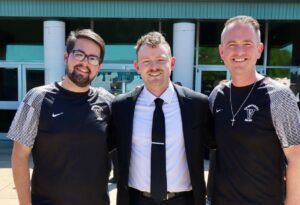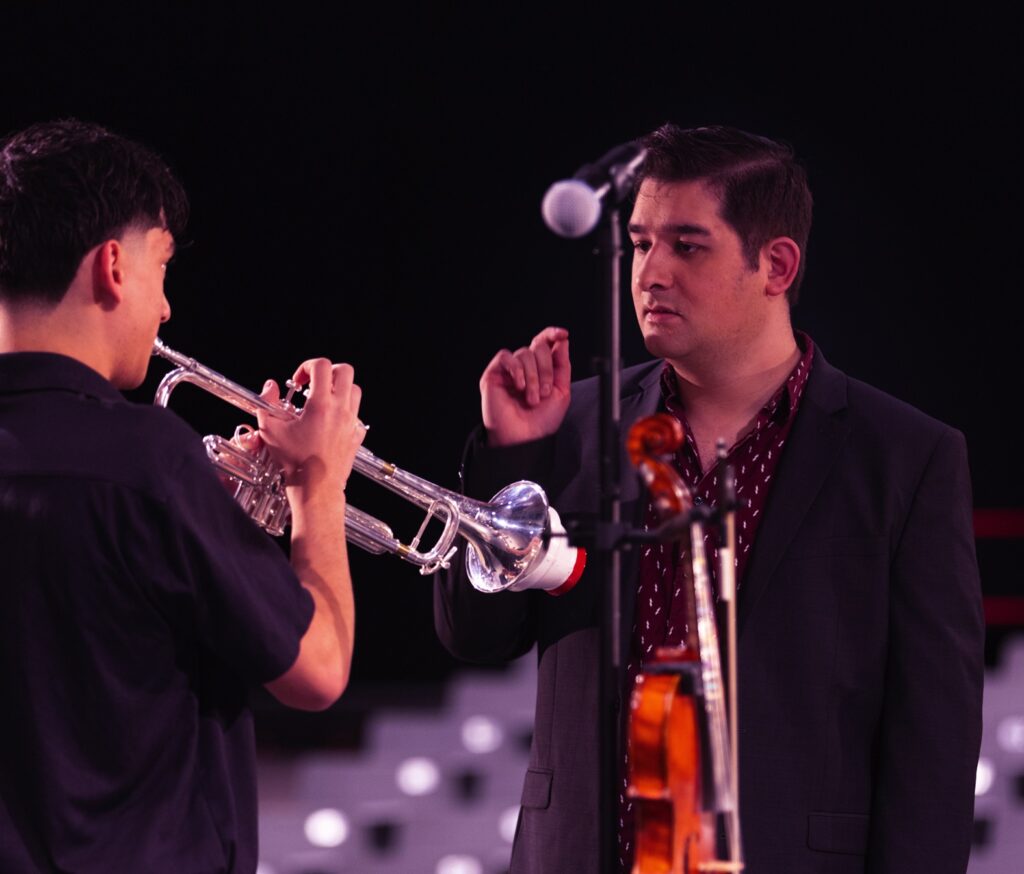Tagged Under:
Band Director Reboot
All educators can benefit from the lessons offered by a veteran music teacher who returns to the classroom after 18 months, determined to keep his energy, passion and joy at the forefront.
The school year — my 16th in the classroom — is winding down. It’s the end of my “reboot” year.
It doesn’t feel possible that it’s almost over. The question that I’m asked most often after 18 months out of the classroom is, “How is it going? Are you happy?”
After a short pause, I always respond, “I am happy and so grateful to be teaching again. I really missed it.”
Still, the end of the school year always feels fast and furious with auditions, concerts, graduations, May band camps, and a significant amount of work to close out the school year. Some days, we are the heroes in the story when concerts and banquets end up being the happiest moments of the year. On other days, we are the villains when auditions and leadership results don’t go as some students and families hope.

I often think how band directing or teaching in general is like Shel Silverstein’s book, “The Giving Tree,” a beautiful story of friendship, empathy, and selfless love. The book is also a cautionary tale and a reminder of what can happen if we constantly give to others without taking care of ourselves in the process. As educators, we invest so much time and energy into our students, our community, and our job. We practice self-sacrifice and serving a higher calling, and sometimes, it can leave us feeling like the stump at the end of Silverstein’s book.
While my musings have clarified things for me during my reboot year, I hope that they can help you if you find the need to refocus, reassess and reestablish priorities.

The Last 18 months
During my 18 months out of the classroom, I started my doctorate in Education Policy at the University of Texas at Austin, and I ran for the District 9 seat on the San Antonio City Council. I lost the election, but I learned so much through the process. For most of 2023 and 2024, I threw myself into my studies, my work with the Boston Crusaders, and full-time consulting in band halls all over Texas through my company, Bandworx.
During this time, I realized how much I missed teaching my own students and ensembles every day. By spring 2024, I was actively looking to return to teaching. When the Vandegrift High School opportunity opened up, I immediately pursued it, and by the end of March, it was set.
Through my time away from Claudia Taylor Johnson High School (CTJ) and joining the program at Vandegrift, I have spent a significant amount of time reflecting on why I left, what the position of Head Director means, and why I came back.
The position of high school band director is one that people work toward for a long time, and the learning curve from being an assistant or working as a middle school director is steep. There is no manual or handbook. It is on-the-job training, and it is a pressure cooker. Like any job, there are challenges and rewards. Most of the time, people only see the rewards from the outside looking in because we rarely share the challenges.

“Stay Hungry, Stay Foolish”
I became the Head Director at CTJ in 2010 when I was 25 years old. In truth, it was the best possible scenario because I was young, ambitious and totally ignorant of the job’s challenges. I followed Steve Jobs’s advice in his 2005 Stanford commencement speech, “Stay hungry, stay foolish.”
Luckily for me, I had three master teachers guiding me — veteran educator, Alan Sharps, who had been teaching for 20 years prior in Virginia Beach and at Winston Churchill High School in San Antonio; Mark Chambers, my Fine Arts Director/lead mentor, who was fresh off of running the Ronald Reagan band program in the early 2000s; and the incredible Manny Maldonado, a veteran teacher from Cedar Park High School in Leander ISD. Thanks to these incredible educators, I had a vision of how to run a successful 6A program. They lifted me through difficult days, guided me through challenging moments, and celebrated with me during high times. Whether you’re 25, 35, 45 or 55, it’s crucial to have a core group of people who support you in this role, answer questions, help you navigate challenges and to act as a sounding board.
While great assistant directors can make the job easier, fun and rewarding, it helps to have some folks in your corner who have lived the role and understand every aspect of what goes into the job. If you ARE fortunate enough to have an assistant who has served in a prior leadership role, make sure to channel that energy because it is special.
Relationships with Administrators and Colleagues
In my 15 years at Claudia Taylor Johnson, I was blessed to have three incredibly supportive principals who valued the band program in different ways. I realize that many of my peers work with principals who may not fully understand or value what they do. Dring my last few years at North East Independent School District (NEISD), I learned the importance of forging relationships with district administration, even when it’s difficult.
Retired NEISD Executive Director of Fine Arts Diana Schumacher taught me to “educate” administrators on the value of my programs by sharing, enlightening, and taking the time to explain what I do and my program’s value. This was huge. Unfortunately, some administrators were not in band or fine arts and don’t fully understand how amazing these programs are. They also may see fine arts as low-hanging fruit when it comes to budget cuts.
Early in my career, I wasn’t the best at supporting other campus organizations like athletics, dance, etc. For many principals, love and support for the campus is the most important thing. While band directors want to put energy into University Interscholastic League (UIL) and Bands of America (BOA), most principals prefer to see us invested in our community. I became better at community support the longer I was at CTJ, and it is a huge priority for me at VHS. I would tell the 2010 version of myself, “Spend more time investing in your relationships with coaches, the dance director, the choir director, and put more into parades, community performances, and things that grow a love for campus culture.”
It’s vital to invest in your relationships with your principal, the coaches, your colleagues — it matters so much. Even if your administrators don’t totally “get it,” keep working to build strong relationships with them. Invite them to your performances and events. Don’t get frustrated when people question you about things that they don’t fully understand. Instead, help them see how your program positively impacts students and adds value to the community.

My Never-Again List
To help maintain my passion and energy, I made a list of “never agains” when I arrived at Vandegrift. This list included things, thoughts, and mindsets that drove me to lose joy and feel worn down at CTJ. Most of the items were self-inflicted – so, since returning to teaching, I have focused on being driven as well as healthier.
Some of the highlights of my list include (in no specific order):
-
- Stop stressing about “the draw” for performance order at contest
- Stop stressing about competition results
- Stop stressing about how other bands are performing
- Stop stressing about being something we cannot be or are not yet
- Stop stressing about more than I can do in a day
- Stop stressing about the eight-minute UIL clock
- Stop stressing about electronic malfunctions this week or at the contest show
- Stop stressing about everything in the show being perfect when I watch the show
- Stop stressing about things not going my way
- Stop stressing about saying “no”
- Stop stressing about too many opinions
- Stop stressing about what the kids will think if we don’t do as well as they want to
- Stop stressing about parents being upset about the day
- Stop stressing about criticism to how I run the day or the rehearsals
- Stop stressing about the kids being tired and cranky
- Stop stressing about money and raising enough of it
- Stop stressing about enrollment / course sign up – some kids will quit and it’s ok
- Stop stressing about kids sharing negative feedback about my teaching or the program
All my “never-agains” are not listed here, but you get the general idea. To create your own list, consider some of the areas or triggers that you could set boundaries for.

“Put the Cup Down”
When I came back to teaching, I talked with a retired band director who asked me what I would do differently this time. He reminded me that the world does not really care about the results at marching contest. He advised me to stay focused on students and on teaching music, which is easier said than done.
I want kids to love music. I want the staff to love work. I also am driven toward excellence and teaching at a high level. Finding a way to balance all this is challenging. In truth, I’ve never really believed that balance is actually possible or something worth pursuing.
However, I am determined to actively take steps to protect myself during my reboot because I realize that as teachers, we cannot pour from an empty cup. A principal at CTJ used to say, “Put the cup down,” which meant that you didn’t have to stop working hard, but you do need to rest from time to time. His wisdom is invaluable.
Here are the most valuable takeaways from year 1 of my reboot:
- Being back with students every day, working towards a common goal
- Making music with students
- Enjoying hanging with the staff and having conversations about how to be better at band
- A football state championship
- A UIL state marching silver medal
- Jazz band performances
- Seeing kids smile
- Seeing kids improve
- Going home at the end of the day, feeling confident that I made the right decision coming back to teaching

While a few of the highlights are related to competition, most are about sharing the joy of music with students and peers. Whenever I start to feel doubt, I review my “never again” list and make a commitment to “put the cup down.”
Try it! You’ll find that this mindset helps you make a pact with yourself to set a few boundaries and stay close to the things that will keep you going. Finding ways to stay fresh and energized about our profession enables us to keep sharing our gifts and giving freely — just like “The Giving Tree.”















